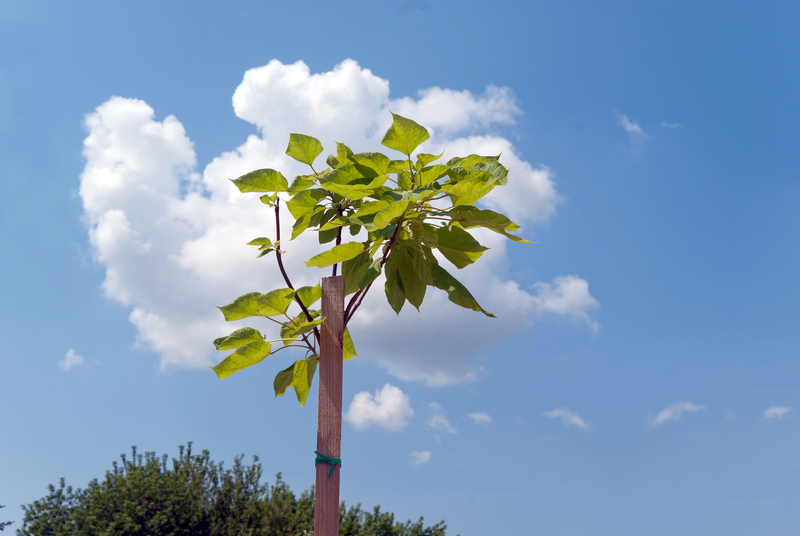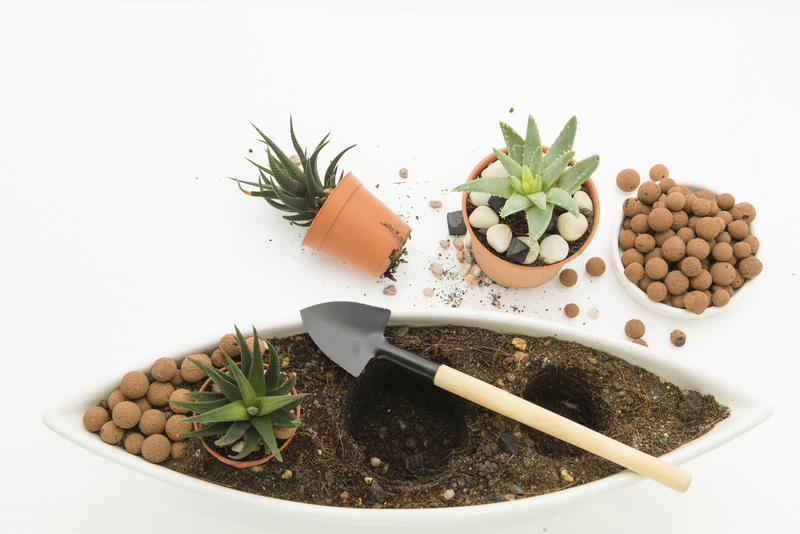Building a dog-friendly botanical paradise
Posted on 28/05/2025
Building a Dog-Friendly Botanical Paradise: A Comprehensive Guide
Can you truly enjoy both a lush garden and the joyful chaos of dogs? Absolutely! Building a dog-friendly botanical paradise is the perfect way to create a safe, engaging retreat for your beloved canine companions while indulging your gardening passion. This article explores actionable steps, practical plant choices, safety tips, enriching features, and inspiring garden design ideas to help you design a harmonious backyard haven.
Why Create a Dog-Friendly Botanical Wonderland?
Many pet owners dream of bountiful gardens overflowing with color, fragrance, and life. But, with energetic pups romping through your yard, some plant choices and layouts can pose real risks. A dog-friendly botanical garden merges the joy of botanicals with spaces thoughtfully curated for canine well-being. This approach:
- Prevents toxic plant ingestion
- Protects your plants from playful paws
- Encourages healthy canine activities and stimulation
- Enriches your connection with nature and pets
- Boosts your outdoor living experience
Let's dive into every aspect of creating a flourishing, dog-safe botanical retreat--starting with foundational planning.

Planning Your Dog-Friendly Garden: The Foundations
Step 1: Assess Your Space and Your Dog's Needs
Begin by observing how your dog uses your yard:
- Where do they run, dig, or nap?
- Are there favorite sun or shade spots?
- Any hazards, escape routes, or problem areas?
Also consider:
- Your dog's size and energy level
- Supervision: Are they left outside alone?
- Durable vs. delicate areas
- Accessibility for both pets and people
Step 2: Zoning for Harmony--Design with Flow
Create distinct zones within your dog-friendly botanical paradise:
- Active Play Areas: Space to romp, chase toys, and stretch their legs
- Rest Zones: Soft shady spots for lounging
- Paths and 'race tracks' for habitual runners
- Plant Protection Borders
- Pet Potty Patches (with easy-to-clean surfaces)
Define each zone visually--with plantings, edging, or hardscape--while keeping sight lines open.
Step 3: Safety First--Dog Proofing Your Paradise
A safe environment is non-negotiable. Address the essentials:
- Secure Fencing: Check for gaps, burrowing hazards, or weak spots
- Opt for gates with child/pet-proof latches
- Cordon off any pools, sharp tools or sheds
- Remove toxic berries, fungi, bulbs, and mulch
- Store lawn chemicals away from paws and noses
Choosing Dog-Safe Plants for Your Botanical Oasis
Pet-Friendly Plant List: Vibrant and Safe Choices
The heart of your botanical paradise is its plants! Many common garden plants are dangerously toxic to dogs (see "What to Avoid" below). Opt for these dog-safe botanical beauties instead:
- Herbs: Basil, thyme, rosemary, sage, mint, parsley
- Ornamental Grasses: Blue oat grass, fescue, carex, fountain grass
- Flowers: Marigold, sunflowers, calendula, pansies, snapdragon, roses
- Shrubs: Bottlebrush, camellias, hardy hibiscus, roses, lilac, viburnum
- Trees: Magnolia, crape myrtle, dogwood (variety-specific), palm (non-toxic species)
- Groundcovers: Irish moss, creeping thyme, ajuga, bugleweed, elfin thyme
Tip: Choose robust, non-toxic plants--those that bounce back from occasional roughhousing.
What to Avoid: Common Toxic Plants for Dogs
Keep your botanical haven free from these hazardous species:
- Oleander
- Azalea and rhododendron
- Foxglove
- Sago palm
- Daffodil and tulip bulbs
- Lily of the valley
- Autumn crocus
- Castor bean
- English ivy
- Yew
For a comprehensive reference, consult the ASPCA's extensive database of toxic and non-toxic plants for pets.
Structures and Hardscape: Durable, Dog-Proof Features
Upgrade your landscape with hard-wearing, paw-friendly materials:
- Flagstone or pavers (set with narrow gaps)
- Pea gravel or decomposed granite
- Mulch--opt for cedar or pine, avoid cocoa mulch (toxic!)
- Composite decking or brick patios
- Shade structures: Arbors, pergolas, awnings
- Raised beds with sturdy borders
This enhances traffic flow, defines dog-safe zones, and prevents muddy paws after rain.
Design Elements for a Gorgeous, Dog-Loving Garden
Appealing Paths and Trails
Dogs naturally create 'desire paths'--beating their own trails through your yard. Embrace this instinct:
- Map your dog's favorite routes and accentuate with smooth stone, mulch, or stepping stones
- Line paths with tough border plants (lavender, rosemary, or ornamental grasses)
- Widen key trails for group play and zoomies
- Curve paths around focal points for interest
Not only do trails corral energetic explorers, they beautifully organize garden beds!
Dog-Safe Water Features
Hydration and play are equally important. Consider:
- Pet-safe fountains or gentle stream features
- Shallow dog pools or splash pads (easy to drain and clean)
- Automatic waterers with fresh, circulating water
Always supervise dogs around water, and avoid deep ponds where a pup could fall in.
Canine Comfort: Napping and Shade
Every botanical paradise needs inviting rest zones. You can:
- Plant small trees for dappled shade--Japanese maple, redbud, serviceberry
- Add raised platforms or dog beds under pergolas or gazebos
- Cluster pots with tall grasses or ferns for cool corners
- Install a doghouse with natural ventilation for hot days
Interactive Features for Canine Enrichment
Dogs crave mental and physical stimulation--even in paradise. Spice up your landscape design with:
- Agility elements--tunnels, ramps, and low jumps
- Sand or gravel "digging pits" for designated excavation fun
- Puzzling scent gardens (plant patches of herbs to sniff)
- Hidden treat zones with safe, edible surprises
Enriching activities prevent boredom and promote calm, healthy behavior in the garden.
Sustainable Garden Care: Eco-Friendly and Pet-Safe
Organic Lawn and Garden Maintenance
Traditional lawn fertilizers, herbicides, and pesticides can spell trouble for four-legged explorers. To keep your garden paw-sitively safe:
- Embrace organic, pet-safe fertilizers and compost
- Mulch weeds rather than spray
- Use physical barriers or non-toxic deterrents
- Always allow chemicals to dry before allowing pet access, if you must apply
Opt for native plantings to reduce pest and maintenance issues naturally.
Lawn Alternatives for Hardy Dog Traffic
Traditional grass lawns often wear out under dog romps and urine spots. Try these alternatives for a durable, low-maintenance dog-friendly botanical paradise:
- Clover lawns--soft, resilient, and dog urine resistant
- Artificial turf for all-weather green
- Mix creeping thyme, Irish moss, or micro clover
- Mulch walkways for muddy-free paths
Seasonal Tips: Keeping Your Dog-Friendly Botanical Paradise Healthy Year Round
Spring/Summer Tasks:
- Inspect for new toxic weeds or mushrooms after rain
- Keep water stations fresh and shaded
- Check fences--dogs may dig more as soil softens
- Groom active areas and replenish mulch
Fall/Winter Mindfulness:
- Clean up fallen fruits and sticks (choking hazards)
- Watch for ice or slippery pavers
- Provide dry resting spots and shelter
- Prune and tidy frost-damaged plants
Regular monitoring and seasonally adjusted care are key to both plant and pet well-being.
Pro Tips for a Seamless Human-Canine Botanical Retreat
- Install outdoor lighting for safe night play
- Consider motion-activated sprinklers to deter unwanted digging
- Use decorative but sturdy edging to keep dogs out of delicate beds
- Educate guests and family on what's dog-safe in your garden
- Create pet photo spots--lush backdrops for joyful memories
Remember: Consistency and positive reinforcement are vital. Gently redirect dogs from forbidden flower beds to designated play areas, rewarding them for respecting "no-go" zones.

Inspirational Dog-Friendly Botanical Garden Examples
Cottage Garden Retreat with Canine Trails
Imagine a border of sunflowers and lavender lining a winding grass trail, with raised beds behind fencing. A mulched agility corner and shady napping pergola make it both enchanting and practical. Decorative trellis screens offer privacy and playful exploration.
Modern Minimalist Play Yard
Large-format pavers with sturdy thyme borders connect a sleek splash fountain and cozy seating. Hardy blue oat grass softens corners, while a laser-cut steel fence assures safety without sacrificing contemporary design.
Wildlife-Inspired Natural Meadow
Prairie grasses, wildflowers, and mown lawn paths create a stimulating environment for canines and beneficial pollinators alike. Raised logs and boulders double as agility challenges and wildlife habitats, while dog-safe berry shrubs complete the circle of abundance.
Conclusion: Living in Harmony--The Joy of a Dog-Friendly Botanical Paradise
With thoughtful design, the natural world and your canine best friend can thrive side by side. Crafting a dog-friendly botanical paradise means safer, happier pets and more abundant gardens.
By making smart plant selections, installing durable features, and nurturing with organic care, your outdoor retreat becomes a sanctuary of beauty, wellbeing, and shared joy--offering endless adventure for both two and four-legged family members.
So grab your trowel, leash up your pup, and start transforming your garden into the ultimate dog-friendly botanical wonderland today!
Latest Posts
Robust Solutions for Minimizing Weather Damage in Your Garden
From Kitchen Castoffs to Soil Gold: The Organic Waste Revolution
Practical approaches to lessen wind disturbance in gardens



